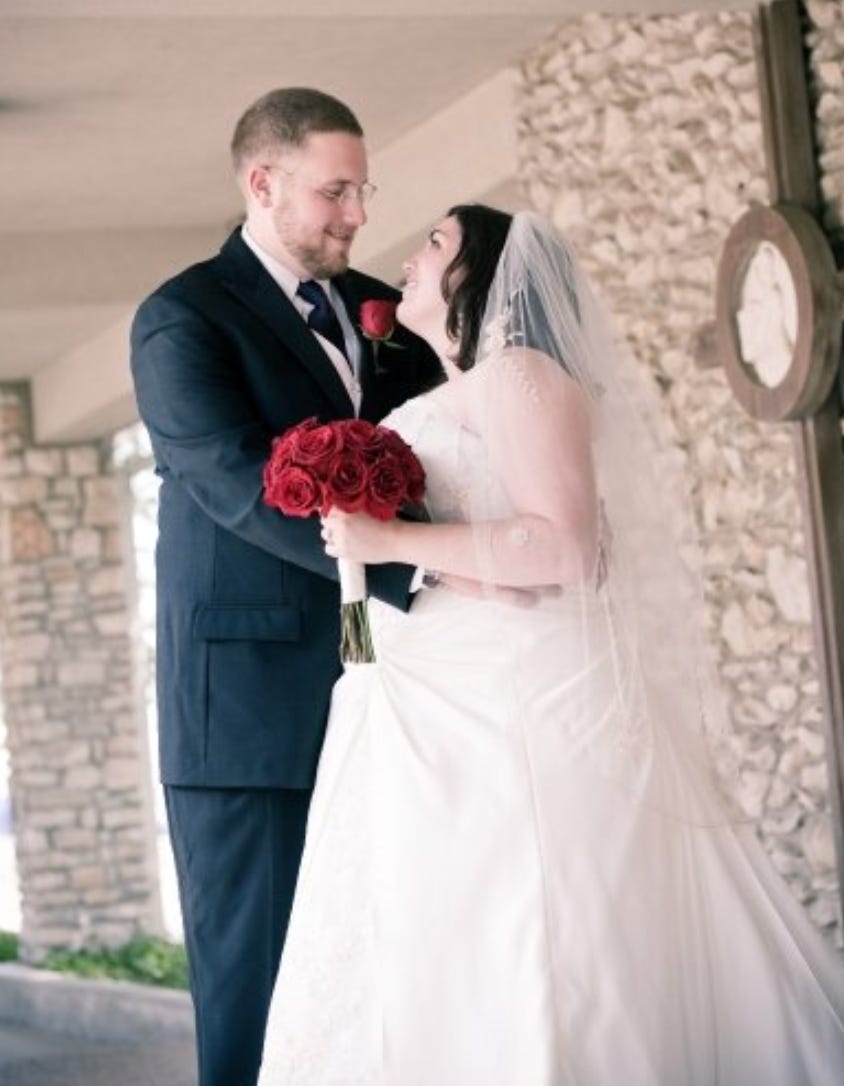(Post-) Ozempic Romance
Would a skinny rose smell as sweet?
Today I learned that there is a study that shows that people who have had bariatric surgery have an increased risk for suicide and non-fatal self-harm. That sucks. I’ll cover bariatric surgery in another issue of The Fat Dispatch, but for now, I’ll just say: that really sucks.
Today I also learned that a study has shown that bariatric surgery affects interpersonal relationships—specifically marriage. According to Swedish researchers, bariatric surgery patients have a higher risk of divorce if they are married and a higher chance of getting married if they are single.
Both of these studies seemingly imply that post-bariatric surgery, people are in a state of emotional flux as well as physical. That’s no surprise to me, given that how we feel is often connected to how our bodies are perceived by society. When a body changes due to bariatric surgery, it will be perceived differently by society—most of the time, as better. This can have a significant impact on how someone feels about their body.
The parallel with body change due to weight loss medications is not a hard jump to make—when a body changes due to weight loss medication, that person is probably going to be in emotional as well as physical flux. Which in turn affects their interpersonal relationships. Particularly their romantic relationships.
On Sunday, the New York Times Magazine put out a piece by Lisa Miller called “How Weight-Loss Drugs Can Upend a Marriage.” It’s behind the paywall, so I took one for the team and bought a month of NYT access to bring you its significant points. Although I specifically subscribed so I could include the article in my roundup for No-Zempic Mondays (a feature of The Fat Dispatch for paid subscribers where I give GLP-1 updates, news, and stories), I realized that this article needed the royal treatment, and so I’m writing about it today in a regular Friday post for The Fat Dispatch.
Here’s why: GLP-1 use has the potential to upend all sorts of relationships. Friendships? Check. Work relationships? Check. Random people on the street? Check. But especially romantic relationships, because of how much our bodies are typically involved. (Sex. I’m talking about sex.)
Why does a weight loss drug have so much potential impact? Because of how poorly fat people are treated by society. Maybe you inhabit a fat body like me. If you don’t, you can imagine, I’m sure, the difference in how you would be perceived if you went from fat to average or thin over the course of a few months. I can imagine how much easier life would be if I were thinner—vulnerable moment…I actually do imagine that a lot! That doesn’t mean I should lose weight. It means that society should treat fat people better.
Have you heard the years-old episode of This American Life in which Elna Baker describes her weight loss journey and how it affected her relationships? It’s a must-listen, but with a major content warning (intentional weight loss, specific numbers and sizes, weight loss surgery). At one point, she asks her husband if he would have still pursued her if she been fat when they met. His response…is awkward, something about how this is the real her now…and it made her wonder.
I wonder if my husband would love me if I were fat.
I’ve never had to wonder this, because my husband married me as a fat lady.
At the time of my marriage, I was small-fat. Over the years, my body has changed and grown and now I’m somewhere in the mid-fat range. (See my Instagram post about the range of fatness.)
When I first started taking Ozempic for Type 2 Diabetes management, I noticed my body changing. (You can read more about my journey with Ozempic here.) It coincided with my new fitness regimen of going to my local Planet Fitness and walking on the treadmill, so at first, I was convinced that I was doing something right. I eventually dropped off with the exercise routine and my body kept changing…so I guess it wasn’t the treadmill.
I lost weight. But because I live in a large body, my weight loss wasn’t very noticeable—I am still very fat. My clothes were looser (neutral) and my A1C was controlled (positive). But what about romance? Did it change?
I honestly hadn’t thought about it until the NYT Mag piece. Let’s look at it for a moment:
Lisa Miller centers the article on Jeanne and Javier, a couple married for 15 years. They originally met in high school, but reconnected 20 years later after both of their first marriages had ended. When they married, Javier was heavier at 260 lbs and Jeanne was her lightest at 160. Over the years, their bodies have changed, with Javier getting into Peleton and getting trimmer while Jeanne gained weight. They have one son together, and in the 10 months since Jeanne started taking Zepbound (a GLP-1 put out by Lilly specifically for weight loss), they haven’t had sex. (FYI it’s the same drug as Mounjaro, just marketed for weight loss instead of diabetes care.)
Since being on Zepbound, Jeanne says that she finds it easier to say ‘no’ to things she doesn’t want. Like sex, for example, which she says she hasn’t been interested in for five years. That may be the drug. Or the antidepressants she’s been on and off for years, or menopause, which Jeanne has recently experienced.
According to the article, some of that has to do with the physical changes: Javier misses the girth of Jeanne’s old body, how it would drape over him, its softness. But it’s Jeanne who puts the breaks on intimacy.
That surprised me when I read it. You would think that since she’s in a smaller body, she would feel more confident naked. Jeanne even says that she and Javier are more evenly matched physically. But no. “I’m very much in flux,” Jeanne says. “Like I haven’t caught up to my body.”
Whatever the reason for their lack of sex, since Jeanne started Zepbound, Javier and Jeanne say that their relationship is the hardest its ever been. They fight and it’s explosive.
It’s more than just physical attributes that have changed about Jeanne, however. She is no longer as extroverted as she used to be. She feels more content with staying home and reading a book. She doesn’t drink anymore. She wonders if she and Javier are still a match—him the outgoing person, ‘life of the party.’
And most of all, she wonders if he judges her for losing weight ‘the easy way.’ He assures her that he doesn’t, but she isn’t so sure.
A notable quote from the article:
“In conversations with her therapist, Jeanne is beginning to understand that her anger at Javier is erupting in the context of her fury at the wider world, where she feels newly visible and acceptable.”
Wow. That she has recognized her anger at the world for how it treats fat people? Amazing.
Jeanne says, “I feel like there’s this different perception of me, when I’m the same person…I’m just 60 pounds lighter.”
Jeanne feels like the same person in so many ways. But she has changed in so many ways, as well. And they don’t tell you about those possible side effects when you’re getting counseled on taking GLP-1s.
The anger that people can’t see past fatness to one’s personhood. The antipathy toward a system that keeps fat people down and rewards thin people. The absolute rage when fatness is still seen as a negative personality trait that needs to be changed somehow. I feel all that, even more acutely since taking Ozempic.
[If you haven’t read my piece Ozempic and Me, maybe take a minute to do so. I describe my journey of refusing to take a bigger dose of the drug to help me lose weight.]
I could up my Ozempic dose and lose more weight if I wanted to. That’s what my doctor wants me to do. But what would it bring me? I would eat less (that’s how GLP-1s work…) and I would have more side effects like diarrhea. And…
Another quote from the article stopped me in my tracks:
“Food and physical intimacy are, of course, essential human needs, but they also signify so much more—safety, pleasure, comfort, love, a mutual sense of giving and receiving—so the sudden upset of these routines can translate as a loss of shared identity.”
My husband and I enjoy sharing food together. I’m in eating disorder recovery, so it is very complicated, but we have found that a celebration of food is key to my healing and our joy. (We take our rule “no food rules” very seriously.)
Like Jeanne and Javier, we’ve been married for 15 years. We have 4 kids together. And intimacy is not the easiest thing in the world—but Javier and Jeanne’s story is evidence to me that losing weight wouldn’t necessarily make sex better. It could come with a whole new world of emotional upheaval. It would disrupt our eating patterns and put my eating disorder recovery into jeopardy…it could ruin our precious life together. I’m not letting GLP-1 use for weight loss* do that to us.
I like who I am in my fat body. My husband does, too. Ozempic has only changed one thing for us as a couple—we are more united than ever to fight weight stigma in our own family, to be the front lines of defense against anti-fatness for our children’s sake.
And that fight is worth it.
-AMB
P.S. If you’re struggling on your journey with GLP-1s—whether to take them or not, for weight loss or diabetes management—consider becoming a paid subscriber to The Fat Dispatch. For $7/month, in addition to regular Friday fat liberation pieces like this one, you’ll receive No-Zempic Mondays, where I share news, updates, stories, and doctor scripts for resisting weight loss drugs. There is also a chat community for support on the Substack app.
*I’m specifically talking about GLP-1 use for weight loss, not for diabetes management. As you can tell from this piece, I *am* on Ozempic, just at a lower dose to manage my A1C. I’m all for personal autonomy—take GLP-1s for weight loss if you so desire. I’m writing to show another side of the conversation than the one that is presented by the drug companies and obesity doctors and researchers.






Thank you so much for sharing. These perspectives on weight loss and weight loss surgery/drugs are so important to share. It’s not straightforward. So thank you for your openness and dissecting the NYT piece!
I remember the pain of losing weight and suddenly being accepted wholly by society. The relief but also the anger- why am I only acceptable now? After putting myself through so much shit? Although diet culture teaches us that shrinking ourselves will “fix everything”- it actually causes so much physical and mental turmoil.
I'm at my year's anniversary of bariatric surgery and have so many thoughts about the mental health aspects. The first three months in particular were extremely rough psychologically. A big aspect for me was this expectation that everything was going to be great and then I did it and it was much tougher than I realized it would be. Nothing can prepare you for life post op. Many people blame it on "food addiction" and there's definitely a component of mourning food, but it's more than that as you mention. Thanks for the great piece.